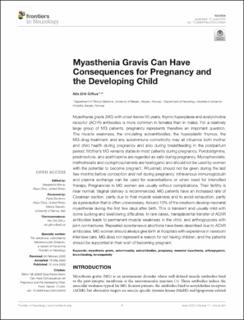Myasthenia gravis can have consequences for pregnancy and the developing child
Journal article, Peer reviewed
Published version

Åpne
Permanent lenke
https://hdl.handle.net/11250/2739088Utgivelsesdato
2020Metadata
Vis full innførselSamlinger
- Department of Clinical Medicine [2064]
- Registrations from Cristin [9742]
Sammendrag
Myasthenia gravis (MG) with onset below 50 years, thymic hyperplasia and acetylcholine receptor (AChR) antibodies is more common in females than in males. For a relatively large group of MG patients, pregnancy represents therefore an important question. The muscle weakness, the circulating autoantibodies, the hyperplastic thymus, the MG drug treatment, and any autoimmune comorbidity may all influence both mother and child health during pregnancy and also during breastfeeding in the postpartum period. Mother's MG remains stable in most patients during pregnancy. Pyridostigmine, prednisolone, and azathioprine are regarded as safe during pregnancy. Mycophenolate, methotrexate and cyclophosphamide are teratogenic and should not be used by women with the potential to become pregnant. Rituximab should not be given during the last few months before conception and not during pregnancy. Intravenous immunoglobulin and plasma exchange can be used for exacerbations or when need for intensified therapy. Pregnancies in MG women are usually without complications. Their fertility is near normal. Vaginal delivery is recommended. MG patients have an increased rate of Cesarean section, partly due to their muscle weakness and to avoid exhaustion, partly as a precaution that is often unnecessary. Around 10% of the newborn develop neonatal myasthenia during the first few days after birth. This is transient and usually mild with some sucking and swallowing difficulties. In rare cases, transplacental transfer of AChR antibodies leads to permanent muscle weakness in the child, and arthrogryposis with joint contractures. Repeated spontaneous abortions have been described due to AChR antibodies. MG women should always give birth at hospitals with experience in newborn intensive care. MG does not represent a reason for not having children, and the patients should be supported in their wish of becoming pregnant.
